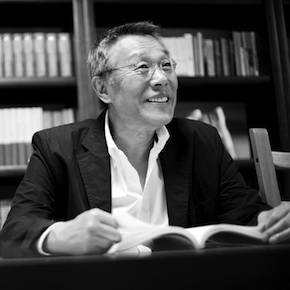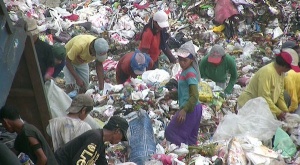Filthy treasures at Flower Island
by Hwang Sok-yong
“Hwang Sok-yong’s empathy for his heroes is always accompanied by a fierce rage against the powerful.” Le Monde Diplomatique
Bugeye heard indistinct chatter around him in his sleep, but decided to stay curled up and ignore it.
“Wake up, honey,” his mother said, pulling the blanket off him. “It’s time to go to work.”
She shook Bugeye, who managed to sit up but still had his eyes closed, and then stood him up by both arms.
“Aren’t you old enough to dress yourself by now?”
While Bugeye stumbled around, shoving his legs into pants and pulling on a long-sleeved shirt, his mother was busy turning herself into a space alien: half of her face was covered with a cloth mask, and she wore a floppy hat with a wide, round brim. Underneath the hat, which was the type that farm women wore while weeding fields, she had wrapped a kerchief around her head. On her hands she wore a double layer of cloth work gloves topped with sturdy rubber gloves. She carried a pitchfork the length of her arm. With boots that came all the way up to her knees, the whole get-up made her look like she was on her way to dig for clams. From out of nowhere, she produced a torn army cap, cloth work gloves, and rubber gloves for Bugeye, as well as a pair of combat boots with the toes so worn-down they’d turned white.
“Our crew leader got all of this for you. Now hurry up!” she said, her voice muffled by the mask.
The cap was so big that it slid down until the rim touched his nose, and the combat boots were so huge that he had plenty of space left in the toes and heels, but the thought that he was becoming a worker today, equal to the grown-ups, made him feel proud. He put on the double layer of gloves, just like his mother’s, and picked up the other pitchfork. Two long baskets with shoulder straps were waiting for them outside. His mother hoisted one of the baskets onto her back first, and Bugeye followed suit: with the basket strapped to his back, he felt he’d instantly grown several inches taller. The main path through the shantytown was already jammed with other people dressed just like them. The crowd pushed on to the clearing in the dumpsite where the trucks turned around, and then everyone quickly dispersed. It seemed they all knew exactly where they were supposed to be.
“Took you two long enough!”
Baron Ashura made his way toward them against the flow of people, and put his hand on Bugeye’s mother’s shoulder.
“I’m sorry,” she said. “The path was so crowded…”
“It’s fine. Now then, you see those two mounds?”
“I see four.”
“No, no, just the big ones. On the right is the district sector, and on the left is the private sector. We go to the right.”
As they worked, the trash pickers’ legs sank deeper and their feet caught on things, and sometimes objects clung to their boots and only let go after a shake or two.”
Other than a quick glance up and down, the Baron acted like Bugeye wasn’t even there. He was probably thinking, Thank goodness the basket wasn’t dragging on the ground at least. The towering mounds were filled with all variety of discarded things. After the trash pickers had gone over the pile and picked out whatever they could, a bulldozer came along to flatten down what remained. As they worked, the trash pickers’ legs sank deeper and their feet caught on things, and sometimes objects clung to their boots and only let go after a shake or two. When they reached the top of the mound, they could see the riverside expressway and its line of trucks with their headlights on, crawling over the bridge onto Flower Island. Clouds of dust billowed in the glow of the headlights. The leaders for each district sector called out to their work teams.
“All right! Double file! Get a move on!”
The Baron explained that from five to nine in the morning was the busiest, as that was when the best items could be found. The next batch came in at noon, and the last batch came in the evening, which meant they would be at it for over twelve hours every day. The workers stood with their districts and waited for the garbage truck marked with their district number to pull in. The ones in front were those who had paid the permit fee and were officially registered to work on the first line. After they’d fished out the best items, the second-line workers were allowed to go through whatever was left. The Baron gave Bugeye’s mother tip after tip.
“Whoever snags it first, it’s theirs. Understand? Plastic containers and anything made from thin plastic comes later. Most important is linoleum, tarp, and anything made from thick plastic. If it’s metal, grab it. Glass bottles, grab it. As for clothes or rags or other fabric, unless it’s in good shape, skip it. Paper comes first.”
The Baron had tips for Bugeye, too.
“You’re supposed to be in the second line, but stay right behind your mother, and grab whatever she misses. If her basket gets full, go empty it for her and bring it back.”
The garbage trucks began to file in. The garbage that arrived early in the morning was mostly from the downtown and commercial areas, so it contained the best items. The residential-area and apartment-complex trash came in around noon, and the waste from nearby construction sites and factories came later. The trucks with their headlights beaming crawled single-file up the hill, illuminating the black swarms of flies that buzzed around in the dust clouds. The crew leader of another unit who’d been checking the district numbers printed under the driver’s side windows called out, and one of the trash pickers swiftly ran forward and guided the truck like a traffic cop to the spot where his unit would be working that day. The driver circled around and backed into place as the man shouted, “A little further, a little further!” The truck stopped, and the bed of the truck began to lift. Garbage poured out, and the pickers from that unit raced toward the pile. More trucks kept pulling into the dumpsite.
The Baron called out to his unit, “Here comes our truck!”
Hard Hat ran ahead to guide the truck, and the rest of the pickers chased after it as it drove past. The truck turned around and dumped the garbage as other trucks from the same district poured in. The trash pickers instantly dove into the pile, causing one of the trucks that had been backing up to hit the brakes and the driver to scream out the window, “You tryin’ to kill yourself? Who’s in charge here?”
When Baron Ashura stepped into the headlights and waved his arms, the driver recognised him right away.
“What the hell?” the driver yelled. “You trying to get my arse thrown in jail?”
“I warn them over and over, but they don’t listen! Cut me some slack!”
“Do you know how many people’ve died out here under these trucks?”
“I’ll take care of it!”
The Baron picked up a four-by-two and swung it about as he chased away the trash pickers who’d already climbed onto the pile. The pickers quickly backed off to behind the waiting line. Baron Ashura tried to catch his breath as he yelled, “Who said you could go in without my signal? If there’s an accident, we’ll all get kicked out! You wanna blow your permit fees like that?”
After all of the trucks in his district had dumped their trash and left, the Baron raised one arm like a general leading his army and roared, “Now!”
Forty-odd trash pickers ran toward the pile of garbage that towered over them. Though it was her first time, Bugeye’s mother followed everyone else up the pile, scrambling on all fours, with Bugeye right on her tail. The Baron caught up with them and tossed a crumpled plastic bottle into her basket. While his mother picked through the better items in front, Bugeye followed behind and collected the second-line items that the Baron had told him to look out for: yogurt bottles, empty cosmetics jars, broken plastic dippers and basins, cans, glass bottles. Most of the other trash pickers were wearing the types of headlamps that miners wore, and were able to spot higher-priced recyclables right away, but it was his mother’s first day on the job, and not only was she unused to the work, it was still dark out. Even after turning something up with her pitchfork, she had to bring her face right up to it before she could see what it was. That was if she could grab it at all. The others closest to her didn’t hesitate to snatch items away before she could get them. Bugeye stayed close to his mother, and grabbed whatever he could.
The garbage was dirty and ugly, but it was also black and white and red and blue and yellow and iridescent and shiny… but above all, none of it looked familiar.”
The work started at the top of the heap and made its way down: the pickers picked out items at random as they shuffled backwards, turning the trash over with their pitchforks as they went. By the time they made it to the bottom, the rubbish heap was flatter and more spread out than when they’d started. Back to the top they would go, digging their pitchforks in deeper and casting them about wider to pick out more items, and then they made their way over the top and down the other side to repeat the whole process, turning the mound of trash over bit by bit on their way down, and picking through it all again carefully on their way back up. It took them ten to fifteen minutes per truck, and when the first line was done, the second line came in to pick at the leftovers.
As day broke, the sky turned a deep red. The garbage was dirty and ugly, but it was also black and white and red and blue and yellow and iridescent and shiny, and it was smooth and square and angular and round and long and limp and stiff, and it refused to budge and it sprang out of the pile and it rolled down the slope, and it smelled acrid and it smelled foul, and it made your breath catch and your nose run and it made you gag, but above all, none of it looked familiar. When you looked at the trash one item at a time, the objects frightened you somehow, like seeing a leg that had fallen off a baby doll, even though you’d known all of these things forever. Bugeye foolishly sunk his pitchfork into something that had caused his mother to startle and shudder: a liquid something squirted out, and whatever it was got dragged up by the sharp prong of his pitchfork. The head looked like it belonged to a cat. The eyes were nothing but holes, and the sockets looked sunken, and he recognised it as a cat from the pointy ears on each side, but below the exposed fangs, the little belly was hollowed out. No, it wasn’t hollow – it was packed with writhing maggots. The maggots spilled onto Bugeye’s boots. He shuddered and threw it behind him. It was only later that he learned it, too, was just one of the many things the city discarded, no different from a crushed soda can or an empty soju bottle containing a cigarette butt with teeth marks still on it. Each item carried with it an air of sadness or regret, and maybe it was that air which left Bugeye feeling so frightened and out of place. When the sun rose, flies swarmed in and covered the bodies of the trash pickers and the piles of garbage.
The trucks never stopped rolling in, from every corner of the city. The landfill stretched along the river from the southeast to the southwest end of the island; the district sector was the length of seventy baseball fields, while the private sector was the length of a hundred-and-one fields. Twenty-one districts dumped their garbage there, but since the only people allowed to pick through the trash were those who had paid a permit fee through one of the crew leaders, each work crew was basically in charge of three or four different districts. When the first line finished one pile, they moved on to the next, and the second line would take the first line’s place on the previous pile. Later, trucks carrying fill dirt would arrive and cover the garbage with earth, signalling an end to the morning’s work.
From Familiar Things, translated by Sora Kim-Russell
Read our review of Familiar Things
 Hwang Sok-yong, born in 1943, is the recipient of Korea’s highest literary prizes. His novels and short stories are published in North and South Korea, Japan, China, France, Germany, the US, the UK and Australia. Previous novels include The Ancient Garden, The Story of Mister Han, The Guest, The Shadow of Arms and Princess Bari. Familiar Things is out now in paperback and eBook from Scribe. Read more.
Hwang Sok-yong, born in 1943, is the recipient of Korea’s highest literary prizes. His novels and short stories are published in North and South Korea, Japan, China, France, Germany, the US, the UK and Australia. Previous novels include The Ancient Garden, The Story of Mister Han, The Guest, The Shadow of Arms and Princess Bari. Familiar Things is out now in paperback and eBook from Scribe. Read more.
Author portrait © Philippe Lissac
Sora Kim-Russell is a Korean-American literary translator born and raised in the US, now living in Seoul. She teaches courses in translation at EWHA women’s university and LTI Korea. Her previous translations include Hwang Sok-yong’s Princess Bari and Gong Ji-young’s Our Happy Time.
sorakimrussell.com


